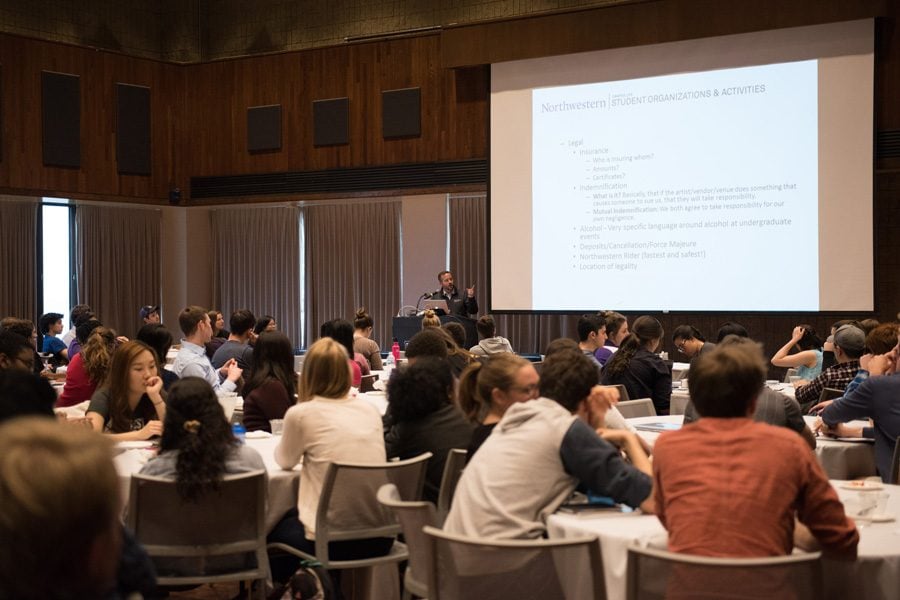Students mixed on Northwestern’s potential open-group mandate
Lauren Duquette/Daily Senior Staffer
Brent Turner, executive director of Campus Life, addresses group leaders at the Student Organization Symposium in the Louis Room at Norris University Center. Turner’s office recently announced plans to mandate most groups admit all interested students by the end of next academic year or risk losing resources from the University.
May 16, 2016
Students expressed mixed feelings about University plans to mandate most groups admit all interested students, an effort to eliminate Northwestern’s culture of exclusivity by the end of next academic year.
“Nepotism on this campus is definitely a problem,” said Chris Landy, a Communication and Bienen sophomore. “The admissions process … is a really flawed way of accepting someone into a group considering that Northwestern is an educational institution, not a corporation.”
Brent Turner, executive director of Campus Life, said his office devised the goal last month after more than five years of discussion about the exclusive nature of student organizations. The initiative, which applies to most groups that recruit through an application process, will end a “system of privilege and oppression” that has long existed in the University community, he said.
Since news of the planned change broke Sunday, Turner said he had received four emails, evenly split between supporters and critics of the plan. Next month, he said his office plans to hold open dialogues aimed at gathering input from the community, and by Sept. 1 they will have devised more concrete details on implementation.
Students reacted strongly to the news on social media — some favored the effort to increase inclusivity, while others said the policy would decrease member commitment and result in students using group participation to pad their resumes.
Kathir Sundarraj, director of the Institute for Student Business Education Analytics sub-group, said he “hated” having to reject students, but opening groups to all would dilute the learning experience for which many sign up in the first place. On Wednesday, he said he plans to introduce an Associated Student Government resolution against the new policy.
“People in the leadership of these organizations … don’t like the exclusive culture, but at the same time it’s hard for us to strike a balance,” Sundarraj said. “If we’re looking for real solutions, we need to work within the existing framework.”
Sundarraj, a Weinberg junior, said if group leaders were transparent about their applicants, they could collectively ensure a more even distribution of membership. For example, he said he accepted about 9 percent of applicants to his sub-group this year, some of whom had signed up for another campus business organization. Had he known about their dual-membership, Sundarraj said he might have not accepted them.
Engineers Without Borders, an engineering service organization, has always been open to all students, said president Jesse Vegas-Perkins. The group requires that prospective members submit an application and come in for an interview but admits everyone who completes those requirements. Although Vegas-Perkins said she supports the spirit of the new policy, it hasn’t been completely successful for her group in the past.
“It was really hard to manage and also make meaningful connections with a lot of people and so for both of those reasons (new members) didn’t continue to come back,” the McCormick junior said. “They didn’t feel like they were really part of it — they were just another person who was assigned a task.”
To some degree, Turner said, drop-offs are part of the process. He said the important part is that students get to try out an organization before deciding to disengage.
Turner said some groups may be exempt from the new policy, a decision his office would make on a case-by-case basis. Sexual Health and Assault Peer Educators, for example, works directly with the Center for Awareness, Response and Education and might not fall under the policy, said SHAPE’s executive director Molly Benedict. The nature of their work — sexual health education and sexual assault survivor advocacy — means the group has to be selective about accepting new members, Benedict said.
“The fact of the matter is there are perpetrators on Northwestern’s campus,” the Weinberg junior said. “And SHAPE can’t have people who are perpetrators being presenters about issues of sexual health or sexual assault.”
For Landy, who said the current application process had discouraged him from trying new groups, the policy will be a welcome change.
“The intense admissions process really promotes a sense of entitlement, and entitlement riddles this campus,” he said. “People literally think that they are above others. We’re all students, we were all admitted to Northwestern.”
Email: [email protected]
Twitter: @davidpkfishman


